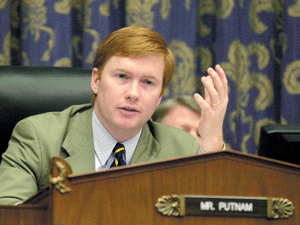SmartBuy a tough sell

A top House lawmaker is pressing the General Services Administration to move forward with the SmartBuy enterprisewide software licensing program. The Office of Management and Budget has said SmartBuy will save more than $100 million annually, but GSA faces resistance from agencies and contractors that question how the program will work and whether they will benefit from it.
A top House lawmaker is pressing the General Services Administration to move forward with the SmartBuy enterprisewide software licensing program. The Office of Management and Budget has said SmartBuy will save more than $100 million annually, but GSA faces resistance from agencies and contractors that question how the program will work and whether they will benefit from it.Rep. Adam Putnam, R-Fla., chairman of the House Government Reform subcommittee on technology, information policy, intergovernmental relations and the census, asked GSA for a progress report and a list of possible impediments to the program."The subcommittee is not aware of any meaningful progress being made to achieve SmartBuy's cost savings goals for fiscal 2003, nor plans for additional near-term cost savings in early 2004," Putnam wrote in a letter to GSA administrator Stephen Perry in late September.Putnam expects GSA to respond by the middle of October, said Bob Dix, Putnam's subcommittee staff director.OMB introduced SmartBuy in February in the fiscal 2004 budget request, and named GSA as the federal executive agent this summer. SmartBuy's purpose is to drive down the cost of enterprise licensing and improve the terms agencies receive from software vendors. OMB issued guidance to agencies in August, asking them to freeze new or renewal software licenses unless the SmartBuy team approved them.OMB and GSA had said they wanted several enterprisewide agreements to be in place by Sept. 30. According to one industry association, Mark Forman, before leaving his post as administrator for e-government and IT, had said he expected GSA to finish as many as 10 contracts. [IMGCAP(2)]GSA, though, has yet to move the program out of the starting gate."There are no unique challenges to buying software as compared to other governmentwide projects," Perry said. "We are asking the agencies to work collaboratively, and that is new for agencies, just as it was for e-government. Different agencies are at different stages, and we have to help them figure out how it all fits together."While GSA wrestles with agency collaboration, vendors also are questioning the effort."A number of our members said they don't see what is in it for them," said Larry Allen, executive vice president of the Coalition for Government Procurement, a Washington trade association. "Vendors see a centralized acquisition program as a good thing, but it does not address all parts of the acquisition process and may not decrease their overall cost of doing business," Allen said. "That is not a problem of GSA's making; that is a fundamental issue with what SmartBuy is."Robert Cresanti, vice president of public policy for the Business Software Alliance, said turnover at OMB, with the departures of Forman and Mitchell Daniels, former OMB director, is part of the reason for the delay. But he and other association and contractor officials said there still are too many unanswered questions. Cresanti said BSA officials recently met with Clay Johnson III, OMB deputy director for management, to discuss some of the issues. Cresanti said BSA wants OMB to: "If agencies feel they can't move without doing a SmartBuy program, that causes constipation in the federal supply line," Cresanti said. "The government needs to open up channels to work with industry."Mark Bohannon, general counsel and vice president for government affairs for the Software and Information Industry Association in Washington, said GSA needs to do a better job of defining commodity software and explaining how the program will affect the relationship between an agency and vendor when licenses need to be renewed.GSA also must figure out how to involve resellers in the SmartBuy licensing process, said Keith Hodson, a spokesman for Microsoft Government of Washington. Most large software companies, such as Microsoft, sell to agencies through resellers, not directly. "We think that the partner ecosystem should be part of any SmartBuy discussion, since they will be directly affected by the initiative," Hodson said. "We feel in many ways the government is already receiving tremendous deals through our enterprise agreements, because we tailor them to their requirements and needs."Max Peterson, vice president of federal sales for Vernon Hills, Ill.-based CDW Government Inc., said he's uncertain whether additional discounts offered to the government will outweigh the cost of administering licenses enterprisewide.However, Peterson said the initiative already has had some benefit by highlighting the opportunity for agencywide software buying."The discussion has highlighted the opportunity for aggregation. The question is what level of aggregation is appropriate," Peterson said.Perry said GSA is trying to find an approach that will benefit the government and vendors."Making smart purchases takes into account the benefits of both sides of the equation," Perry said. "We are working to find the proper balance."But while GSA is figuring this out, Putnam said he was concerned that agencies would be forced to renew licenses under more expensive terms."We want to move the ball up the field in these government reform initiatives, of which SmartBuy is part of ," Dix said. "OMB said there would be savings in fiscal 2003, and we want to see where it is and if there is anything we can do from a congressional standpoint."Dix said the subcommittee has not received complaints from vendors about the program, and the letter was part of its normal oversight."We want to achieve the savings, given the budget constraints everyone is facing," Dix said.Dix said oversight hearings are a possibility, depending on GSA's response. Staff Writer Gail Repsher Emery can be reached at gemery@postnewsweektech.com. Jason Miller is a staff writer for Government Computer News and can be reached at jmiller@postnewsweektech.com.

 No 'meaningful progress' on enterprisewide software licensing, lawmaker says
No 'meaningful progress' on enterprisewide software licensing, lawmaker says

Rep. Adam Putnam, R-Fla., chairman of the House Government Reform subcommittee on technology, information policy, intergovernmental relations and the census, asked GSA for a progress report on the SmartBuy program.
J. Adam Fenster

"We are asking the agencies to work collaboratively, and that is new for agencies, just as it was for e-government. Different agencies are at different stages, and we have to help them figure out how it all fits together." | GSA's Stephen Perry
WT photo
- Clarify the rules of enterprisewide buying so vendors can understand them better
- Develop a process for dealing with potential disruptions of renewal or new software purchases
- Assist vendors in finding a way to lower costs, such as a governmentwide centralized billing or shipping process.
NEXT STORY: Brief: Local exchange services